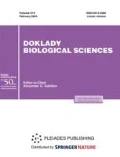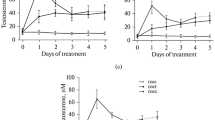Abstract
One of the complications of type 2 diabetes mellitus in men is steroidogenic and spermatogenic dysfunctions. There is evidence of a restoring effect of the antidiabetic drug metformin on them. We studied the effect of MF therapy (4 weeks, 200 mg/kg/day) on the hormonal parameters of the gonad axis and on the morphological characteristics of epididymal spermatozoa in male rats with a severe form of T2DM caused by a high-fat diet and a low-dose streptozotocin. It has been shown that MF therapy, along with the restoration of the metabolic parameters, normalizes the plasma levels of testosterone and leptin and the content of testosterone, its precursors, leptin and its receptors in the testes, and also increases sperm motility, which is reduced in T2DM. This is the result of both the systemic action of MF and its direct effect on testicular cells.
Similar content being viewed by others
REFERENCES
Jangir, R.N. and Jain, G.C., Curr. Diabetes Rev., 2014, vol. 10, no. 3, pp. 147–157. https://doi.org/10.2174/1573399810666140606111745
Fink, J., Matsumoto, M., and Tamura, Y., Steroids, 2018, vol. 138, pp. 161–166. https://doi.org/10.1016/j.steroids.2018.08.002
Schernthaner, G. and Schernthaner, G.H., Diabetes Res. Clin. Pract., 2020, vol. 159, p. 107946. https://doi.org/10.1016/j.diabres.2019.107946
An, H. and He, L., J. Endocrinol., 2016, vol. 228, no. 3, pp. R97–R106. https://doi.org/10.1530/JOE-15-0447
Faure, M., Bertoldo, M.J., Khoueiry, R., et al., Front. Endocrinol. (Lausanne), 2018, vol. 9, p. 675. https://doi.org/10.3389/fendo.2018.00675
Derkach, K.V., Bondareva, V.M., Chistyakova, O.V., et al., Int. J. Endocrinol., 2015, vol. 2015, p. 245459. https://doi.org/10.1155/2015/245459
Derkach, K., Zakharova, I., Zorina, I., et al., PLOS One, 2019, vol. 14, no. 3, e0213779. https://doi.org/10.1371/journal.pone.0213779.
Nna, V.U., Bakar, A.B.A., Ahmad, A., and Mohamed, M., Andrology, 2019, vol. 7, no. 1, pp. 110–123. https://doi.org/10.1111/andr.12567
Nna, V.U., Bakar, A.B.A., Ahmad, A., et al., Andrology, 2019. https://doi.org/10.1111/andr.12739
Liu, H., Lin, S., Lv, Q., et al., Adv. Exp. Med. Biol., 2017, vol. 975, part 2, pp. 801–811.https://doi.org/10.1007/978-94-024-1079-2_62
Hasan, M.M., El-Shal, A.S., Mackawy, A.M.H., et al., J. Cell. Biochem., 2020, vol. 121, no. 2, pp. 1524–1540. https://doi.org/10.1002/jcb.29388
Wang, X., Zhang, X., Hu, L., and Li, H., Reprod. Biol. Endocrinol., 2018, vol. 16, no. 1, p. 55. https://doi.org/10.1186/s12958-018-0368-4
Giovambattista, A., Suescun, M.O., Nessralla, C.C., et al., Neuroendocrinology, 2003, vol. 78, no. 5, pp. 270–279. https://doi.org/10.1159/000074448
Yuan, M., Huang, G., Li, J., et al., Reprod. Biol. Endocrinol., 2014, vol. 12, p. 15. https://doi.org/10.1186/1477-7827-12-15
Pinto-Fochi, M.E., Pytlowanciv, E.Z., Reame, V., et al., Reproduction, 2016, vol. 152, no. 6, pp. 795–808. https://doi.org/10.1530/REP-16-0072
Funding
This work was supported by the Russian Foundation for Basic Research and DNT (no. 18-515-45004 IND-a) and the state assignment AAAA-A18-118012290427-7. For the ELISA experiments, the equipment of the Center for Collective Use of the IEPB RAS was used.
Author information
Authors and Affiliations
Corresponding author
Ethics declarations
STATEMENT ON THE WELFARE OF ANIMALS
All procedures for the care and use of animals were performed in an accordance with the requirements of the Ethics Committee of the IEFB RAS (Protocol no. 2/3-2019, March 29, 2019), the European Communities Council Directive 1986 (86/609/EEC) and the “Guide for the Care and Use of Laboratory Animals”.
CONFLICT OF INTEREST
Authors report no conflicts of interest.
Rights and permissions
About this article
Cite this article
Derkach, K.V., Bakhtyukov, A.A., Bayunova, L.V. et al. Normalization of Testicular Steroidogenesis and Spermatogenesis in Male Rats with Type 2 Diabetes Mellitus under the Conditions of Metformin Therapy. Dokl Biol Sci 493, 110–113 (2020). https://doi.org/10.1134/S0012496620040031
Received:
Revised:
Accepted:
Published:
Issue Date:
DOI: https://doi.org/10.1134/S0012496620040031



